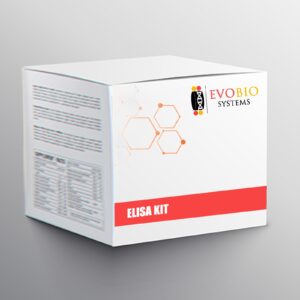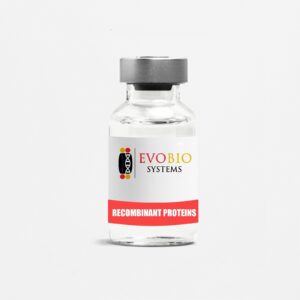Showing 19–27 of 142 results
-
Rat T3 (Triiodothyronine) ELISA Kit
(Cat No. 2530011)Product Details
Reagents Quantity Storage Condition 48T 96T Pre-Coated Microplate 6 strips x 8 wells 12 strips x 8 wells -20°C (6 months) Standard (Lyophilized) 1 vial 2 vials -20°C (6 months) Biotinylated-Conjugate (100×) 30 μL 60 μL -20°C (6 months) Streptavidin-HRP (100×) 60 μL 120 μL -20°C (6 months) Standard/Sample Diluent Buffer 10 mL 20 mL 4°C Biotinylated-Conjugate Diluent 5 mL 20 mL 4°C HRP Diluent 6 mL 12 mL 4°C Wash Buffer (25×) 10 mL 20 mL 4°C TMB Substrate Solution 6 mL 10 mL 4°C (store in dark) Stop Reagent 3 mL 6 mL 4°C Plate Covers 1 piece 2 piece 4°C $0.00(No) -
Rat T4(Thyroxine) ELISA Kit
(Cat No. 2530012)Product Details
Reagents Quantity Storage Condition 48T 96T Pre-Coated Microplate 6 strips x 8 wells 12 strips x 8 wells -20°C (6 months) Standard (Lyophilized) 1 vial 2 vials -20°C (6 months) Biotinylated-Conjugate (100×) 30 μL 60 μL -20°C (6 months) Streptavidin-HRP (100×) 60 μL 120 μL -20°C (6 months) Standard/Sample Diluent Buffer 10 mL 20 mL 4°C Biotinylated-Conjugate Diluent 5 mL 10 mL 4°C HRP Diluent 6 mL 12 mL 4°C Wash Buffer (25×) 10 mL 20 mL 4°C TMB Substrate Solution 6 mL 10 mL 4°C (store in dark) Stop Reagent 3 mL 6 mL 4°C Plate Covers 1 piece 2 piece 4°C $0.00(No) -
Rat TSH (Thyroid Stimulating Hormone) ELISA Kit
(Cat No. 2530013)Product Details
Reagents Quantity Storage Condition 48T 96T Pre-Coated Microplate 6 strips x 8 wells 12 strips x 8 wells -20°C (6 months) Standard (Lyophilized) 1 vial 2 vials -20°C (6 months) Biotinylated-Conjugate (100×) 60 μL 120 μL -20°C (6 months) Streptavidin-HRP (100×) 60 μL 120 μL -20°C (6 months) Standard/Sample Diluent Buffer 10 mL 20 mL 4°C Biotinylated-Conjugate Diluent 6 mL 12 mL 4°C HRP Diluent 6 mL 12 mL 4°C Wash Buffer (25×) 10 mL 20 mL 4°C TMB Substrate Solution 6 mL 9 mL 4°C (store in dark) Stop Reagent 3 mL 6 mL 4°C Plate Covers 1 piece 2 piece 4°C $0.00(No) -
Recombinant Human 4-1BB Receptor (TNFRSF9)
Product Details
Gene ID 3604 Accession Q07011 Alternative Name Tumor necrosis factor receptor superfamily member 9, 41BB, 4-1BB ligand receptor, CDw137, T-cell antigen 4-1BB homolog, T-cell antigen ILA, CD137<br/>Recombinant Human 4-1BB (TNFRSF9) Species Human Source E. coli Description 4-1BB Receptor (CD137) is a member of the TNF receptor superfamily expressed on activated CD4 and CD8 T cells as well as on activated natural killer cells. The binding of 4-1BB Receptor to its TNF family ligand, 4-1BB ligand (4-1BBL) delivers a co-stimulatory signal to resting T cells leading to high level IL2 production independently of CD28 signaling. Recombinant Human 4-1BB Receptor represents the soluble, cysteine-rich TNFR-like extracellular domain of 4-1BB Receptor. Accession Q07011 Functions The ED50 as determined by dose dependent proliferation of human megakaryocytic leukemia cell line is <0.5ng/ml. Formulation Lyophilized from 0.2 ?m filtered solution in PBS (pH 7.5) Solubility A quick spin of the vial followed by reconstitution in distilled water to a concentration not less than 0.1 mg/mL. This solution can then be diluted into other buffers. Appearance Lyophilized Powder Molecular Weight 18 Purity >95% as determined by SDS-PAGE Concentration <1.0 EU/μg of recombinant protein as determined by the LAL method Shipping Condition Ambient Temperature Storage Condition Recombinant 4-1BB Receptor can be stored in working aliquots at 2? – 8?C for one month, or at -20?C to -70?C for twelve months. Avoid repeated freeze/thaw cycles. $0.00(No) -
Recombinant Human 4-1BB Receptor (TNFRSF9)
Product Details
Gene ID 3604 Accession Q07011 Alternative Name Tumor necrosis factor receptor superfamily member 9, 4-1BB ligand receptor, CDw137, T-cell antigen 4-1BB homolog, T-cell antigen ILA, CD_antigen=CD137, CD137, ILA<br/>Recombinant Human 4-1BB (TNFRSF9) Species Human Source CHO cells Description 4-1BB Receptor (CD137) is a member of the TNF receptor superfamily expressed on activated CD4 and CD8 T cells as well as on activated natural killer cells. The binding of 4-1BB to its TNF family ligand, 4-1BB ligand (4-1BBL) delivers a costimulatory signal to resting T cells leading to high level IL-2 production independently of CD28 signaling. Accession Q07011 Functions The activity was tested by the ability of immobilized recombinant mouse 4-1BBL to bind human 4-1BB with a linear range of 10-500 ng/mL. Formulation Recombinant Human CD137 is lyophilized from 0.2 ?m filtered PBS solution, pH7.2. Solubility A quick spin of the vial followed by reconstitution in distilled water to a concentration not less than 0.1 mg/mL. This solution can then be diluted into other buffers. Appearance Lyophilized Powder Molecular Weight 65 Purity >95% as determined by SDS-PAGE Concentration <1.0 EU/μg of recombinant protein as determined by the LAL method. Shipping Condition Ambient Temperature Storage Condition Recombinant Human CD137 can be stored in working aliquots at 2? – 8?C for one month, or at -20?C to -70?C for twelve months. Avoid repeated freeze/thaw cycles. $0.00(No) -
Recombinant Human 4-1BB Receptor (TNFRSF9)
Product Details
Gene ID 3604 Accession Q07011 Alternative Name Tumor necrosis factor receptor superfamily member 9, 4-1BB ligand receptor, CDw137, T-cell antigen 4-1BB homolog, T-cell antigen ILA, CD_antigen=CD137, CD137, ILA<br/>Recombinant Human 4-1BB (TNFRSF9) Species Human Source CHO cells Description 4-1BB Receptor (CD137) is a member of the TNF receptor superfamily expressed on activated CD4 and CD8 T cells as well as on activated natural killer cells. The binding of 4-1BB to its TNF family ligand, 4-1BB ligand (4-1BBL) delivers a costimulatory signal to resting T cells leading to high level IL-2 production independently of CD28 signaling. Accession Q07011 Functions The activity was tested by the ability of immobilized recombinant mouse 4-1BBL to bind human 4-1BB with a linear range of 10-500 ng/mL. Formulation Recombinant Human CD137 is lyophilized from 0.2 ?m filtered PBS solution, pH7.2. Solubility A quick spin of the vial followed by reconstitution in distilled water to a concentration not less than 0.1 mg/mL. This solution can then be diluted into other buffers. Appearance Lyophilized Powder Molecular Weight 65 Purity >95% as determined by SDS-PAGE Concentration <1.0 EU/μg of recombinant protein as determined by the LAL method. Shipping Condition Ambient Temperature Storage Condition Recombinant Human CD137 can be stored in working aliquots at 2? – 8?C for one month, or at -20?C to -70?C for twelve months. Avoid repeated freeze/thaw cycles. $0.00(No) -
Recombinant Human 4-1BB Receptor (TNFRSF9)
Product Details
Gene ID 3604 Accession Q07011 Alternative Name Tumor necrosis factor receptor superfamily member 9, 41BB, 4-1BB ligand receptor, CDw137, T-cell antigen 4-1BB homolog, T-cell antigen ILA, CD137<br/>Recombinant Human 4-1BB (TNFRSF9) Species Human Source E. coli Description 4-1BB Receptor (CD137) is a member of the TNF receptor superfamily expressed on activated CD4 and CD8 T cells as well as on activated natural killer cells. The binding of 4-1BB Receptor to its TNF family ligand, 4-1BB ligand (4-1BBL) delivers a co-stimulatory signal to resting T cells leading to high level IL2 production independently of CD28 signaling. Recombinant Human 4-1BB Receptor represents the soluble, cysteine-rich TNFR-like extracellular domain of 4-1BB Receptor. Accession Q07011 Functions The ED50 as determined by dose dependent proliferation of human megakaryocytic leukemia cell line is <0.5ng/ml. Formulation Lyophilized from 0.2 ?m filtered solution in PBS (pH 7.5) Solubility A quick spin of the vial followed by reconstitution in distilled water to a concentration not less than 0.1 mg/mL. This solution can then be diluted into other buffers. Appearance Lyophilized Powder Molecular Weight 18 Purity >95% as determined by SDS-PAGE Concentration < 1.0 EU/μg of recombinant protein as determined by the LAL method. Shipping Condition Ambient Temperature Storage Condition The lyophilized protein is stable for at least one year from date of receipt at -70?C. Upon reconstitution, this cytokine can be stored in working aliquots at 2? – 8?C for one month, or at -20?C for six months, with a carrier protein without detectable loss of activity. Avoid repeated freeze/thaw cycles. $0.00(No) -
Recombinant Human 4-BBL (TNFSF9)
Product Details
Gene ID 8744 Accession P41273 Alternative Name TNFSF9, CD137L, 4BBL Species Human Source E. coli Description Human 4-BBL or TNFSF9 is a member of the TNF superfamily. It is a type 2 transmembrane protein expressed on activated T-cells. It is a bidirectional signal transducer which acts as a costimulatory receptor molecule on T lymphocytes. Its functions primarily stimulate the immune response by promoting the release of cytokines such as IL-2 and IFN-gamma. TNFSF9 works with TNFRSF9 for the generation of cytotoxic T cells, proliferation of T-cells as well as antigen presentation. It also reactivates T lymphocytes which have become anergic. It is also expressed on activated NK cells, B-cells, macrophages, dendritic cells and some brain cells. Recombinant Human 4-BBL is a 19.6 kDa protein. Accession P41273 Functions coming soon Formulation coming soon Solubility N/A Appearance Lyophilized Powder Molecular Weight 19.6 Purity >95% as determined by SDS-PAGE Concentration <1.0 EU/μg of recombinant protein as determined by the LAL method Shipping Condition Ambient Temperature Storage Condition The lyophilized protein is stable for at least one year from date of receipt at -70?C. Upon reconstitution, this cytokine can be stored in working aliquots at 2? – 8?C for one month, or at -20?C for six months, with a carrier protein without detectable loss of activity. Avoid repeated freeze/thaw cycles. $0.00(No) -
Recombinant Human 4-BBL (TNFSF9)
Product Details
Gene ID 8744 Accession P41273 Alternative Name TNFSF9, CD137L, 4BBL Species Human Source E. coli Description Human 4-BBL or TNFSF9 is a member of the TNF superfamily. It is a type 2 transmembrane protein expressed on activated T-cells. It is a bidirectional signal transducer which acts as a costimulatory receptor molecule on T lymphocytes. Its functions primarily stimulate the immune response by promoting the release of cytokines such as IL-2 and IFN-gamma. TNFSF9 works with TNFRSF9 for the generation of cytotoxic T cells, proliferation of T-cells as well as antigen presentation. It also reactivates T lymphocytes which have become anergic. It is also expressed on activated NK cells, B-cells, macrophages, dendritic cells and some brain cells. Recombinant Human 4-BBL is a 19.6 kDa protein. Accession P41273 Functions coming soon Formulation coming soon Solubility N/A Appearance Lyophilized Powder Molecular Weight 19.6 Purity >95% as determined by SDS-PAGE Concentration <1.0 EU/μg of recombinant protein as determined by the LAL method. Shipping Condition Ambient Temperature Storage Condition The lyophilized protein is stable for at least one year from date of receipt at -70?C. Upon reconstitution, this cytokine can be stored in working aliquots at 2? – 8?C for one month, or at -20?C for six months, with a carrier protein without detectable loss of activity. Avoid repeated freeze/thaw cycles. $0.00(No)







